The future is already here: AI agents are actively shaping how the industry works today.
In the year 2025, these intelligent systems are capable of resolving the users’ issues and providing them with a personalized experience.
Are you the one seeking to enter the AI agents industry or want to build one?
Then, learning about the latest AI agent trends in 2026 is significant.
Well, no need to worry, in this blog, we have covered it all, from best AI agents to industry-specific use cases, and more.
Let’s walk you through it all.
What is an AI Agent in 2026?
Before you explore the future trends of AI agents, let’s learn about the concept first.
An AI agent is a software system that uses artificial intelligence to autonomously perform tasks and achieve significant goals, often without any human intervention.
These agents can perceive their environment, help to process the information, make decisions, and take actions to complete the tasks. The core characteristics of AI agents are autonomy, goal-oriented, user-focused, action-oriented, and environment interaction.
Along with this, it can be defined that AI agents can encompass a wide range of functions that are beyond natural language processing, as well as include decision-making, problem-solving, interacting with external environments, and be useful in performing actions.
The AI agents market size was valued at USD 5.25 billion in 2024, and is projected to grow from USD 7.84 billion in 2025 to USD 52.62 billion by 2030, at a CAGR of 46.3% during the forecast period.
Along with this, the global AI agents market size was reached at USD 7.13 billion in 2024, and is expected to be worth around USD 89.87 billion by 2034, this is growing at a CAGR of 43.98% over the forecasted period from 2025 to 2034.
Hence, it can be stated that the AI agent market is continuously growing at a vast scale. Now, let's learn more about the core capabilities of the modern AI agents in the following section.
Core Capabilities of Modern AI Agents
As part of artificial intelligence agents trends, AI agents with strong reasoning capabilities can analyze data, identify patterns, and make informed decisions based on evidence and context.
Well, when you want to build an AI agent, you should know the capabilities of modern AI agents in detail.
Here, the AI agents with strong reasoning capabilities can analyze the data, useful to identify patterns and helpful to make informed decisions based on the context and evidence.
1. Independent Decision-Making
These AI agents may run independently without perpetual human oversight, processing information, considering alternatives, and performing activities according to specified objectives.
2. Task Automation and Execution
The modern AI agents can autonomously perform repetitive as well as complex tasks with ease. It comprises scheduling, data entry, or system monitoring, which helps humans to focus on higher-level decision-making.
3. Multimodal Input Processing
Current agents can process and integrate data from multiple modalities like text, images, audio, and even sensor input.
4. Predictive Analysis
They predict results and suggest actions based on past data, trends, and current inputs, helping businesses make faster, data-driven decisions.
5. Adaptation and Learning Continuously
AI agents make new discoveries with every interaction or data set, fine-tuning accuracy and performance with time.
6. Awareness of Context
They sense situational context—such as user preference, location, or history—to provide extremely relevant responses or actions.
7. Integration between Systems
They integrate with APIs, enterprise software, IoT devices, and databases to execute cross-platform functions with ease.
With this changing competition towards AI agents, the leading mobile app development services are aware of using and implementing these trends in favor of industries.
After considering the core capabilities, let’s switch to the best Trends of Artificial Intelligence Agents in 2026 in the following section.
Best AI Agents Trends in 2026
When you evaluate the best AI agent trends in 2026, this is the time to stay competitive and even ahead of your competitors.
In this dynamic environment, it's significant to learn about the effective AI agent trends. "The best AI agent trends in 2025 are redefining automation, with smarter decision-making, multimodal capabilities, and deeper human-AI collaboration."
Here are the details to check out.
1. AI Agents in Cybersecurity
Cyberattacks are becoming more sophisticated, and the traditional security systems are finding difficulty to pace with the same. Hence, the implementation of AI in cybersecurity involves autonomous software programs that utilize artificial intelligence to improve security measures.
These AI agents act on behalf of users or systems, automatically detecting threats, responding to incidents, and predicting future vulnerabilities. Here’s a detail on what AI agents are doing under cybersecurity.
► Autonomous Agents
AI agents are autonomous computer programs that help to perceive the environment, make decisions, and take actions to achieve a specific goal.
Here, the AI agents' trends depict that it helps to streamline operations, identifying bugs and errors, continuously monitoring systems, and detecting threats.
This AI agent trend helps to prevent the brands from any sudden issues and bugs.
► Incident Management
The AI agents help to manage the proactive approach through continuously monitoring the system's health and performance metrics, and they can often predict and prevent issues before they grow into full-blown crises.
2. Multimodal AI Agents
The multimodal AI Agents can improve the customer service through delivering more empathetic, context-aware support, through enhancing creative collaboration.
These are the intelligent systems that can be useful in processing and understanding information from diversified data types such as images, videos, and texts.
► Combining Text, Voice, and Visual Understanding
Under this, you can understand how the multimodal AI agents can process inputs from diversified formats, including chat, voice commands, images, and even videos.
Along with this, the agents combine different types of data, such as text, voice, and visual information, to create a richer understanding of the world.
► Real-World Applications of Multimodal AI Agents
It is significant to highlight how the businesses are putting the multimodal AI agents into action, for example, the customer support agents that usually handle both voice queries, along with image uploads.
3. AI Governance Platforms
The artificial intelligence agents trends highlight how AI governance platforms are becoming increasingly important, as AI systems grow more autonomous and integrated across industries.
These are the direct AI research, development, and application for ensuring help, safety, fairness, and respect for human rights.
The AI governance platforms ensure responsible and ethical AI development and deployment, addressing the diversified risks such as privacy infringement and misuse.
► Regulatory Compliance and Risk Management
AI agents are revolutionizing regulatory compliance and risk management by automating tasks, enhancing accuracy, and further improving efficiency.
These agents are developed to monitor, analyze, and adapt to constantly evolving rules, freeing up human resources for the higher-level strategic work.
► Ethical AI and Bias Mitigation
One of the crucial roles of the AI agents is detecting, monitoring, and reducing the algorithmic bias, making AI agents fairer and more responsible.
When analyzing the broader debate of AI agent vs Agentic AI, governance plays a central role, ensuring that both autonomous task-focused agents and broader agentic AI systems operate within ethical and legal boundaries.
4. Collaborative AI agents
Collaborative AI agents are important systems where the diversified and multiple AI agents work together to resolve complicated systems, automating the workflows, and enhancing overall intelligence. It is among the latest AI agent trends encouraging brands to collaborate.
Additionally, the collaborative AI agent systems coordinate together to complete the complex tasks across the organizational siloes.
► Multi-agent Collaboration
Multiple AI agents interact, divide responsibilities, and pool insights to resolve the complicated issues more effectively. The examples of the multi-agent collaboration include automated manufacturing lines, autonomous vehicle systems, and custom support systems.
► Human + AI Co-Piloting
The collaborative AI agents support humans in decision-making. It does help in providing support for handling the specific procedure for resolving the business challenges. Along with this, the AI agents help in making strategic decisions.
5. Emotionally Intelligent AI Agents
Emotionally intelligent AI agents are computer systems that are designed to recognize, interpret, and respond to human emotions like humans.
These agents leverage the techniques from AI, such as natural language processing (NLP), and computer vision, to analyze different inputs.
► Human-Centric Interactions
Emotional AI Agents enable the understanding of the users’ emotions. These agents perform it through evaluating the facial expressions, voice tone, and text sentiment to gauge the emotional states, as well as tailoring the responses accordingly.
► Applications in Sensitive Sectors
In healthcare, mental health support, HR, and education, empathy isn’t optional. The emotionally intelligent AI agents can provide comfort, encouragement, and motivational feedback through effectively maintaining professionalism.
6. Ethical AI Development
Ethical AI development is the growing AI Agent trend in 2026, which is all about building an artificial intelligence system that aligns with human values and is effective in promoting societal well-being.
The main purpose of ethical AI development is to opt for fairness and bias mitigation, transparency and explainability, accountability, along with privacy and data protection.
► Building Fair and Bias Mitigation
Here, AI systems should not perpetuate or amplify the existing societal biases that might lead to unfair or discriminatory outcomes. You can prioritize the ethical considerations, and developers can reduce the potential biases within the data and algorithms, which might result in more equitable outcomes.
► Transparency and Explainability
This development directly contributes to building transparency and explainability through prioritizing the human-centered design as well as responsible practices. Additionally, the AI development necessitates being transparent about the data to train the AI model.
7. Domain-Specific AI Agents
The domain-specific AI agents are the AI systems that are trained and even focused on resolving problems within a specific industry and business. Unlike the general-purpose AI, they leverage domain-specific AI that is configurable towards a client's use cases.
One of the significant aspects of the domain-specific AI agent trend is, it offers more reliable outcomes, pre-trained data from diversified industry parties, and scaling across enterprises with more use cases.
► Compliance Focused AI Agents
The compliance-focused AI agents can be defined as software systems that leverage artificial intelligence for automating and enhancing various aspects of regulatory compliance. Such agents excel at tasks like regulatory change management, risk assessments, towards internal policies and external regulations.
► Industry Specific Use Cases
These AI agents are designed for specialized industries, offering precision, efficiency, as well as improved decision-making.
From healthcare assistance to travel agents, financial bots, and even providing tutorial guides, the domain-specific AI agents are capable of resolving the real, sector-specific problems, with higher accuracy and ROI than the general AI tools.
8. Autonomous AI Agents
Autonomous AI agents are advanced AI systems that are designed to operate independently, make decisions, and take effective actions for achieving the desired goal along with no human intervention.
An autonomous AI agent is an advanced form of agent that can be understood and helpful in responding to enquiries, then take action, without any human intervention.
► Independent Task Execution at Scale
The Autonomous AI agents can plan, prioritize, execute, and complete the tasks without any kind of constant human input.
From sales outreach to logistics management, the autonomous AI agents work 24/7 and scale like digital teams, helpful to reduce the need for manual intervention.
► Proactive Decision-Making
Proactive decision-making comprises anticipating potential issues, opportunities, and challenges, then taking important action to address the issues, even before they arise.
Beyond automation, the agents can anticipate needs through analyzing data in real time and suggesting or executing actions.
9. Generative & Creative AI Agents
A generative AI agent is software that can interact with the environment, obtain data, and use it for performing specified tasks to autonomously meet the user’s diversified requirements.
These AI agents can successfully process multimodal information, such as text, voice, and audio, to make strategic decisions.
These agents do represent a significant evolution in how AI interacts with the world. The generative AI agents can streamline workflows, help personalize customer interactions, and even contribute to innovation.
This point under the trends of artificial intelligence agents helps brands prevent sudden issues and bugs.
► Personalized, Fast, and User-centric
This is one of the important trends of AI agents, aligned with the Future of Artificial Intelligence Trends.
It focuses on delivering personalized, fast, and user-centric solutions tailored to users’ needs.”
The generative and creative AI agent lowers costs and speeds up workflows, which is helpful in becoming a go-to trend for businesses.
► Drives Creativity and Innovation
The generative AI agents produce text, images, music, videos, and even code.
They are transforming industries by enabling businesses to design, prototype, and create faster responses from the marketing campaigns to the product design.
10. Cost-Optimization AI Agents
Cost-optimization AI agents are further designed to perform tasks by minimizing resource consumption and reducing overall expenses.
These agents intelligently balance speed, quality, and performance of the brands. You can save the cost of creating an AI agent through cost optimization.
These AI agents enable businesses to make informed decisions, price products more accurately, and allocate resources more efficiently. These cost-optimized AI agents can improve your overall operations.
► Automating Resource and Expense Management
The cost optimization AI agents monitor cloud usage, IT resources, and operational expenses in real-time.
Along with automating the cost tracking, making adjustments accordingly helps the businesses to cut any unnecessary costs.
► Improves Financial Forecasting
When you opt for the cost-optimization AI agents, this further results in financial forecasting. AI agents can reshape financial forecasting and budgeting by analyzing the financial information, market trends, and economic indicators to generate accurate projections.
Well, considering these AI agent trends in 2026 can help you identify the current competition and the present preferences of the users.
You can connect with the AI app development services to help you identify the basics of integrating these AI agents.
Industry-Specific Future Use Cases
The industry-specific future use cases are a well-scoped project or a set of projects, on a focused subject area, informed by the needs of the industry.
Here is the detail of the use cases related to AI agents. Let’s learn them below.
A] Healthcare
The AI agents are used in the healthcare sector, helping doctors to diagnose issues through analyzing scanning, lab reports, along patient histories.
AI in healthcare helps in transforming healthcare by optimizing treatment plans and streamlining administrative procedures. These agents are useful in providing personalized treatment.
B] Finance & Banking
AI in finance can further help in personalizing services and products, creating opportunities, managing risks and fraud, enabling transparency and compliance, through automating operations as well as reducing costs.
Along with this, it helps banks to minimize manual errors in the data processing, analytics, and document processing that follow the same procedure every single time.
C] Dating Industry
AI in dating transforms online dating by enhancing matchmaking, improving safety, and making the conversations even more engaging.
Along with this, AI can help filter the fake profiles and inappropriate content, which is effective to make the online dating experience even safer and more enjoyable.
D] Travel and Hospitality
The travel and hospitality industry encompasses the movement of people along with the services that support their journeys and stays.
AI in hospitality can revolutionize how hotels, restaurants, and other businesses operate and interact with guests.
E] Education
AI in education can be defined as an application of technologies to enhance learning experiences and can further lead to improving the educational process.
It does offer personalized learning pathways, is effective in automating administrative tasks, as well as provides intelligent tutoring systems that generate smart content.
F] Retail and e-Commerce
AI in e-Commerce significantly enhances both retail and e-Commerce operations by providing personalized experiences, optimizing operations, and enhancing the customer experience.
These agents automate tasks, enhance customer experience, and are effective in optimizing operations.
Well, considering these case studies, are you ready to convert your dream into reality?
Then, let’s get ahead to the next section.
What is the Future of AI Agents?
The AI agents are predicted to become increasingly prevalent and sophisticated over the next decade, transforming different aspects of work and daily life.
Let’s examine the future of AI agents below.
► Self-evolving AI agents
The self-evolving AI agents are the autonomous systems that continuously learn, adapt, and enhance their environment, without requiring any direct human intervention. These agents improve themselves without any constant human retraining.
It is the future of the AI agents as these agents can rewrite parts of their own algorithms, adapt to new environments, and optimize the overall performance. These AI agents evolve their capabilities over time through interactions with their environment.
► AI-Powered Economies
Ai to Ai economies refers to the economic systems where the artificial intelligence technologies are effective and useful for creating, managing, and operating other AI systems that help to form a self-sustaining and potentially transformative economic model.
This is the future of the AI agent, which is all concentrated on allocating a highly decentralized economy, with different AI entities interacting with each other within the complex network.
► Embodied AI in Robotics
Embedding AI in robotics offers a future where AI agents, acting as the brains of robots, achieve greater autonomy, enhance learning, and lead to seamless collaboration with humans.
Here, you need to combine machine learning algorithms with robotic systems. This further comprises utilizing AI techniques such as machine learning, deep learning, helpful to the changing environment.
► Hyper-Personalized AI Companions
By the year 2035, people might completely rely on the AI agents for resolving their issues related to orders or any kind of online queries. This will be the next future AI agent trends for 2026.
There might be personal AI agents that act as lifelong companions-managing schedules, finances, health, and even providing emotional well-being with deep personalization.
► Long-term Memory & Identity
The AI agents can provide persistent memory and personality, enabling the brands to analyze the current preferences of the users. This future AI agent trend is important, enabling users to project details, so that they can check out the history of conversations.
Effective to project details, or custom parameters, that are securely stored so that the models can recall them weeks and months later without any kind of reminder.
These were some of the crucial predictions to be noted for future AI agents, aligning with the Future of Artificial Intelligence Trends.
Work with JPLoft to Create Your Next AI Agent
At JPLoft, you can evaluate what the next AI agent trend is and how you can use it to your advantage. Our team is ready to help you with the recent research on the AI agents, and then use them according to the users.
We are the leading AI Agent Development Company focused on delivering projects with honesty and integrity. Our team can help businesses build end-to-end AI agents through combining deep expertise in AI development with industry-focused solutions. From designing autonomous and collaborative agents for integrating multimodal and emotionally intelligent capabilities.
We can enhance the customer experiences and stay competitive in the rapidly evolving AI-driven landscape. This is all about the experiences across domains like healthcare, fintech, and more. Our team can help you with all the possible aspects.
Conclusion
The rise of AI agents in 2026 marks a turning point for businesses and industries worldwide.
From cybersecurity to multimodal processing, governance, and emotional intelligence, these agents are reshaping how organizations operate and connect with users.
Their ability to work autonomously, collaborate across systems, and deliver personalized, data-driven outcomes positions them as indispensable digital co-workers.
Looking ahead, future predictions such as self-evolving agents, AI-to-AI economies, and hyper-personalized companions signal even greater transformation.
Embracing these trends today is key to staying competitive, driving innovation, and building trust in an AI-driven world where intelligent agents are at the center of progress.
FAQs
An AI agent is a software system that autonomously perceives its environment, processes data, makes decisions, and takes actions to achieve specific goals.
AI agents help businesses improve efficiency, automate workflows, enhance customer experiences, and ensure compliance across industries.
Key trends include autonomous AI agents, multimodal agents, AI in cybersecurity, governance platforms, emotionally intelligent agents, and domain-specific AI agents.
They combine text, voice, images, and video inputs to deliver richer, context-aware responses and enable more natural human-AI interaction.
Healthcare, finance, education, travel, retail, and cybersecurity are leading sectors adopting AI agents for specialized use cases.
Future predictions include self-evolving agents, AI-to-AI economies, embodied robotics integration, hyper-personalized AI companions, and agents with long-term memory.





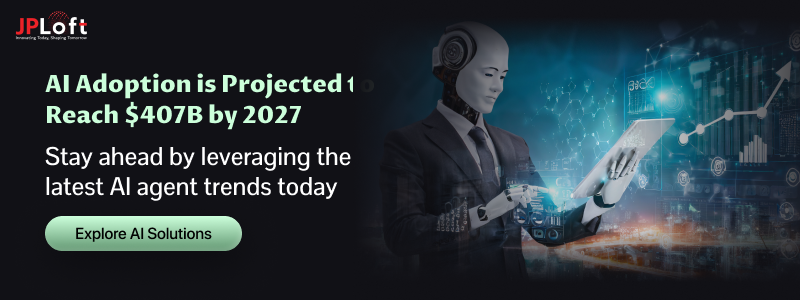
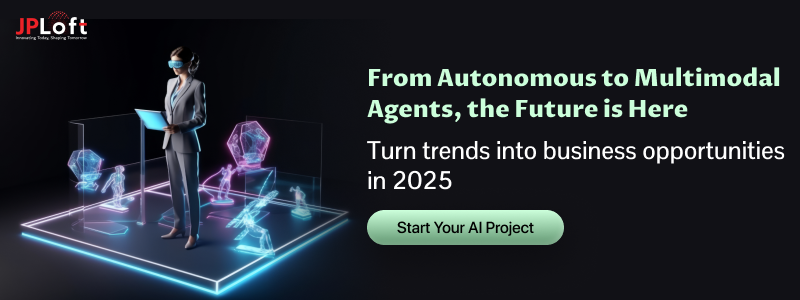

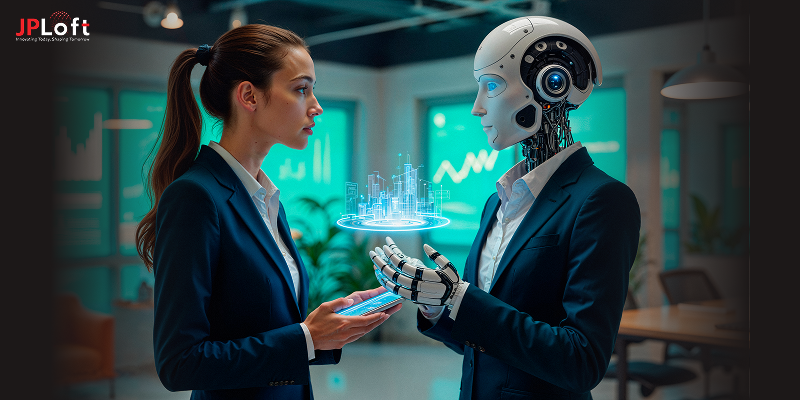
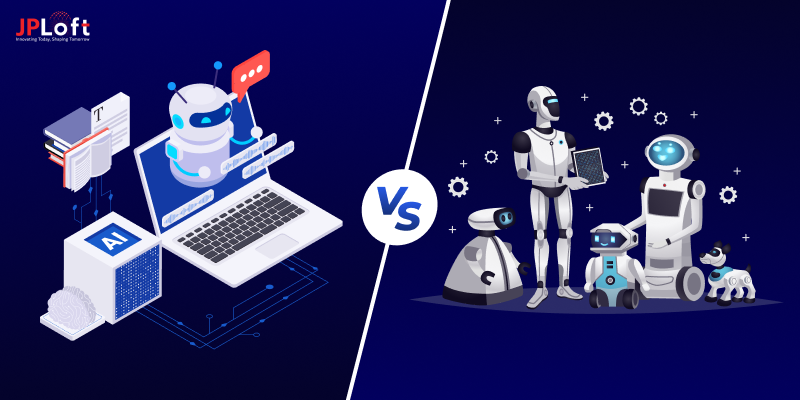
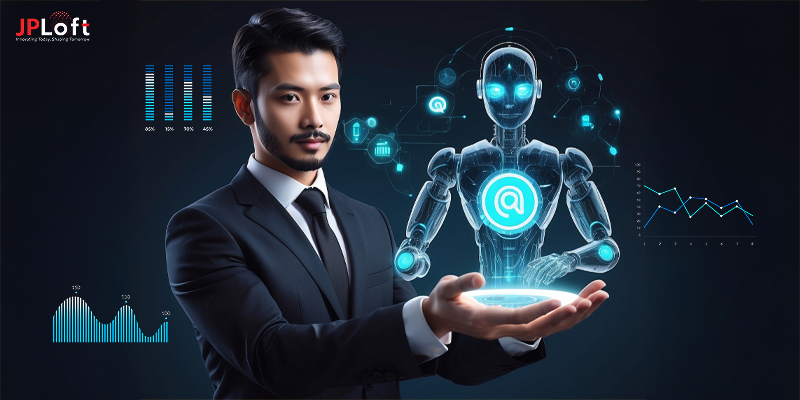


Share this blog